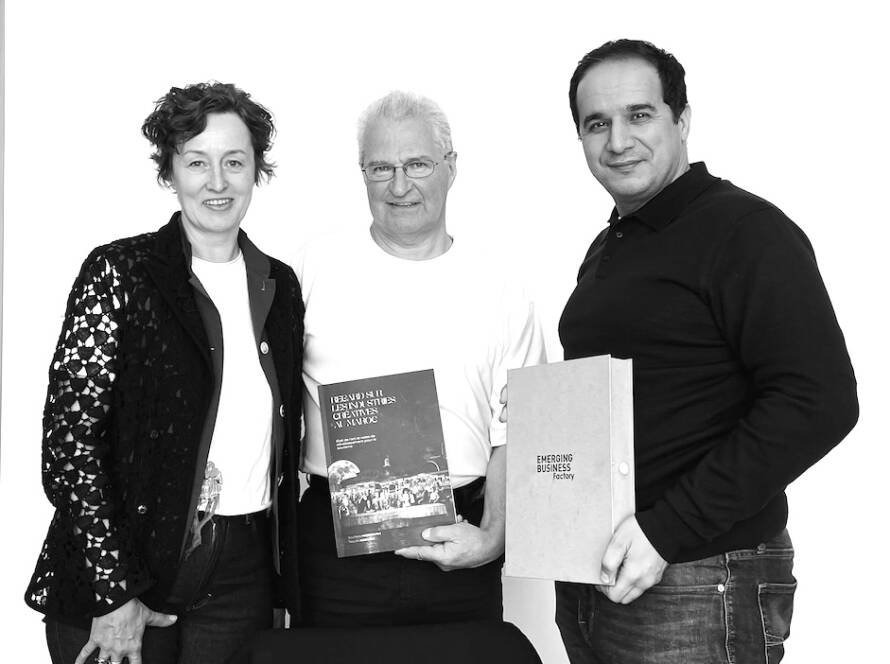(Translated — fortunately — by AI)
It all started with a quiet surprise: while reading the latest World Happiness Report, I saw that Morocco ranks 112th — far lower than the image we have of ourselves. Behind Libya. Behind countries torn by conflict or enduring chronic hardship. And yet, we are living in a time of national pride: Morocco is shining, progressing, inspiring. We’re hosting the 2030 World Cup. We’re redrawing our infrastructures. We’re catching the world’s attention.
This ranking reveals a subtle but essential tension: the gap between reality and perception. Between what we build and what we live. Between what we project and what we feel.
And I find this same tension every day in the eyes of women and men who carry Morocco’s very small enterprises (TPEs) on their shoulders. They too could say: “I’m doing badly, but we are doing well.”
They’re doing badly, because their daily lives are filled with chronic fatigue, informal debts, constant administrative pressure, and an unequal struggle against the shadow economy. They push forward, but against the tide. They believe, but on credit. They work, but without a safety net.
Yet at the same time, they nurture a shared hope. They’re everywhere — in our souks, our neighborhoods, our villages, our digital platforms. They are the living expression of Moroccan resilience, local intelligence, and social cohesion. And in recent years, Morocco has begun to talk about them — recognizing them in strategic plans, naming them in official speeches, placing them at the heart of the national vision.
They hear words like “industrial sovereignty,” “inclusive digitalization,” “green economy.” They see a horizon taking shape. But often, they observe it from a distance — like a beautiful landscape blurred behind a fogged-up window.
Their reality is irregular sales, lack of cash flow, an inability to hire or invest. The support promised to them exists — sometimes even sincerely intended — but rarely felt in practice.
They hear the word “recovery,” but they don’t feel the breath.
The recent decision by Bank Al-Maghrib to lower the key interest rate illustrates this disconnect. In theory, it’s a positive signal. In reality, it benefits those who already have access to leans. The TPE remains at the doorstep — with no leverage, no collateral, no entry. They listen to the economic music like a concert played behind closed doors.
Just hours after the announcement, a small business founder called me. Her voice carried the hope of a fresh breeze. She asked me, almost shyly: “Is it true? Will this really change anything for us?”
I was silent.
I didn’t know what to say.
Not out of cynicism.
But because I knew that the kind of change she was hoping for — the one she needs — won’t come from a few decimal points. It will come the day the system sees her, hears her, understands her.
And maybe that’s what true happiness is in a society — not resource abundance, but the space to dream without shame.
That’s what I witnessed in Finland back in 2019: the right to be naive.
The right to believe that institutions are there for us. The right to ask a question and expect a sincere answer. The right to hope without feeling foolish.
Plato once said that in a just city, each social group must fulfill its role in harmony with the whole. Morocco’s TPEs fulfill this role. In fact, they transcend it. They innovate with little. They hire in uncertainty. They train in urgency. They create value where the traditional economy fears to tread.
But this harmony is only possible when society acknowledges their contribution and builds an ecosystem that’s fair.
Today, tolerating the informal economy in the name of “social peace” silently sacrifices the peace of the formal small business sector. It’s not a compromise — it’s a surrender.
Schopenhauer said that happiness is just a brief pause between two forms of suffering. Maybe that’s exactly how our TPEs experience it. One decent month. One lucky season. Then comes the downturn, uncertainty, stress.
So let’s ask the question: what if happiness became a serious economic indicator? What if we invented a Happiness Index for Entrepreneurs? One not based on turnover or margins, but on:
-
trust in the future,
-
sense of belonging,
-
clarity of rules,
-
quality of relationship with institutions,
-
and the emotional oxygen of the entrepreneur.
If we want Morocco to shine in 2030 — not just in stadiums, but in alleyways, markets, workshops, rural e-commerce platforms — then we must treat each small business as a living cell in the national happiness system.
Not just another lever. A foundation.
Because a truly happy nation is not measured solely by its place in international rankings. It’s measured by how its smallest actors feel seen, respected, and heard.
And what if, tomorrow, instead of asking them how much they earn… we asked them how they feel?
Perhaps then, Morocco wouldn’t just be a showcase of ambition — but a sincere space of shared well-being.


